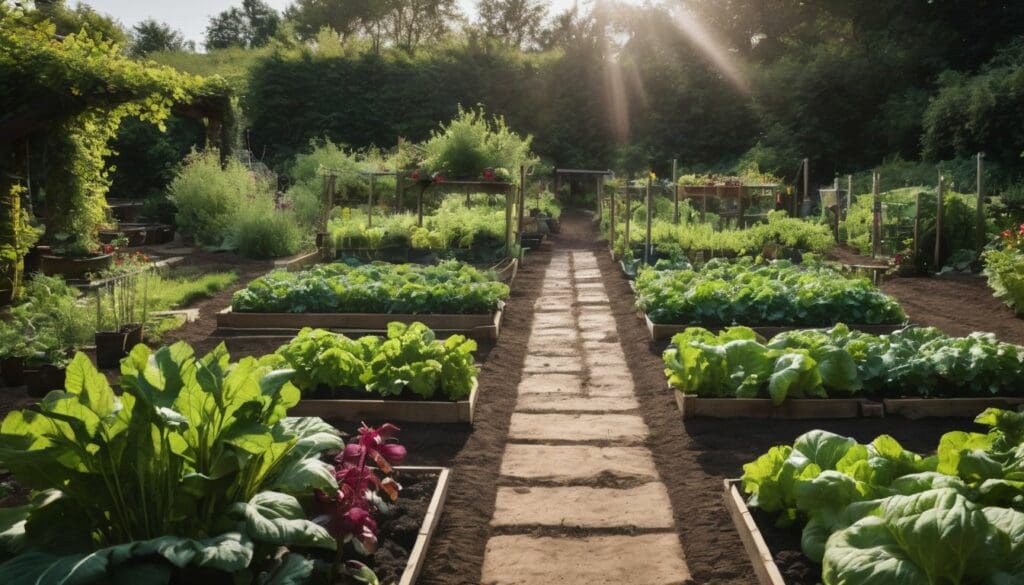As we collectively endeavour to tread lightly upon our cherished Earth, the quest for sustainable modes of living takes on a heightened sense of urgency. Like yourselves, we’ve wrestled with this conundrum and have been heartened by the emergence of eco-villages as beacons of hope.
With projections indicating that come 2050, a staggering 68% of humanity will reside in urban sprawls, these green sanctuaries could well redefine our future domiciles.
Our exploration into these verdant enclaves has illuminated their potential to facilitate lives lived in gentle synchrony with Mother Nature while also cultivating robust community ties.
It’s little wonder then that an increasing contingent amongst us are being drawn to call these eco-villages home—a testament to their allure and promise. Do join us as we delve into the myriad ways they’re shaping a more harmonious existence—your enlightenment awaits!
Key Takeaways
- Eco-villages integrate advanced technology and sustainability, using high-speed internet for efficient communication whilst promoting remote work and online education.
- Residents of eco-villages engage in sustainable food production methods such as organic farming, reducing carbon footprints and fostering self-reliance through local agriculture systems.
- Multi-generational living enhances community bonds within eco-villages, where combined skills and experiences from different age groups offer diverse perspectives on ecological living.
- Eco-village lifestyles encourage environmentally friendly practices including the use of renewable energy, zero-waste initiatives, and green building materials to minimise ecological impact.
- Living in an eco – village can improve mental health through physical activities connected to nature, communal involvement that reduces isolation, and mindfulness practices that alleviate stress.
Trends in Eco-Villages
Digital connectivity is becoming increasingly important in eco-villages, allowing for remote work and online education. There is also a growing focus on sustainable food production within these communities to reduce environmental impact and promote healthy living.
Digital connectivity
We embrace the latest technology to foster digital connectivity within eco-villages, understanding its vital role in creating sustainable communities. Smart use of the internet and renewable energy-powered devices ensures we stay connected with the broader world while minimising our climate impact.
This blend allows us to share innovations in green living and learn from global ecological challenges.
By integrating high-speed internet into our daily operations, we maintain efficiency in communication and enhance educational opportunities for all residents. This forward-thinking approach supports environmental sustainability without forsaking the perks of modern life.
We place a high value on staying well-informed about social transformation, which aids us in refining our practices for utopian living amidst like-minded individuals who are passionate about regenerative villages and alternative lifestyles.
Focus on food production
Eco-villages prioritise food production by implementing sustainable farming practices and creating local food systems. Residents engage in organic farming, permaculture, and communal gardening to ensure a steady supply of fresh, healthy produce.
By focusing on food production, eco-villages reduce their carbon footprint and promote self-sufficiency while fostering a strong sense of community.
Organic farming methods help preserve ecoregions and support environmental conservation efforts within these green communities. The emphasis on food production also encourages residents to embrace eco-conscious living by reducing reliance on processed foods and supporting local agriculture.
Multi-generational living
Multi-generational living in eco-villages fosters a sense of community and shared responsibility. Families, young adults, and elders collaborate to bring diverse skills and experiences to the table, creating an enriching environment for all residents.
This intergenerational interaction promotes learning opportunities while strengthening social bonds within the eco-friendly neighbourhood.
Residents in multi-generational eco-villages benefit from mutual support networks that enhance well-being. Varied perspectives on ecological issues are discussed, promoting understanding across different age groups.
The blending of wisdom from older generations with fresh ideas from youngsters creates dynamic solutions for sustainable living and environmental conservation.
Benefits of Eco-Villages
Eco-villages offer numerous benefits such as environmentally friendly living, improved mental health, and sustainable living practices. These communities provide a space for individuals to connect with nature, live in harmony with the environment, and foster a strong sense of community.
Environmentally friendly
Embracing an environmentally friendly lifestyle is a cornerstone of eco-villages, with a strong emphasis on sustainable practices. From renewable energy sources to zero-waste initiatives, eco-villages prioritise reducing their ecological footprint.
Residents actively participate in organic farming and composting, promoting local produce and minimising transportation emissions. The use of eco-friendly building materials and efficient water conservation systems further underlines the commitment to environmental stewardship within these communities.
Incorporating renewable resources such as solar panels and wind turbines is integral to creating an environmentally friendly atmosphere in eco-villages. This holistic approach fosters a deep connection with nature while inspiring global awareness and understanding of pressing environmental issues.
Improved mental health
Living in an eco-village encourages physical activity and access to nature, which can enhance mental well-being. Engaging in communal activities and shared responsibilities fosters a sense of belonging and reduces feelings of isolation.
The supportive environment promotes emotional resilience and positive relationships, contributing to overall mental health.
Eco-friendly neighborhoods offer opportunities for mindfulness practices such as meditation or yoga, creating a peaceful atmosphere that can alleviate stress. Additionally, the emphasis on sustainable living instills a sense of purpose and accomplishment, positively impacting self-esteem.
Sustainable living
Embracing sustainable living in eco-villages means making conscious choices to minimise our environmental impact. By reducing energy consumption, actively recycling, and utilising renewable resources, we contribute to the preservation of our planet for future generations.
Implementing eco-friendly practices such as composting, water conservation, and organic farming also fosters a deeper connection with nature and promotes healthier living environments.
Choosing sustainable living in eco-villages empowers us to live in harmony with the natural world while nurturing a sense of community. Engaging in these intentional practices not only benefits the environment but also enriches our lives by encouraging mindfulness and fostering a greater appreciation for Mother Earth.
Conclusion
In conclusion, eco-villages are gaining popularity as people embrace alternative living. They offer the potential for social and ecological transformation in response to global challenges.
These eco-friendly neighborhoods promote sustainable living and communal living, making them an attractive option for environmentally conscious individuals. With their focus on digital connectivity, food production, and multi-generational living, eco-villages are redefining traditional housing models.
FAQs
1. What are eco-villages?
Eco-villages are ecofriendly neighbourhoods designed as alternative living spaces which focus on ecological and social transformation through sustainable practices.
2. Why are people interested in joining eco-villages?
People join eco-villages to become part of utopian communities that aim for a more eco-conscious living, helping tackle global challenges by practising communal living and alternative housing solutions.
3. Can living in an eco-village really make a difference to the environment?
Yes, by embracing alternative lifestyles within these villages, residents significantly reduce their environmental impact and contribute to positive ecological changes.
4. Are there different types of eco-villages?
Indeed, the concept of an eco-village can vary widely; some might prioritise self-sufficiency while others may put more emphasis on social aspects or use innovative designs for creating a collaborative community focused on sustainability.





